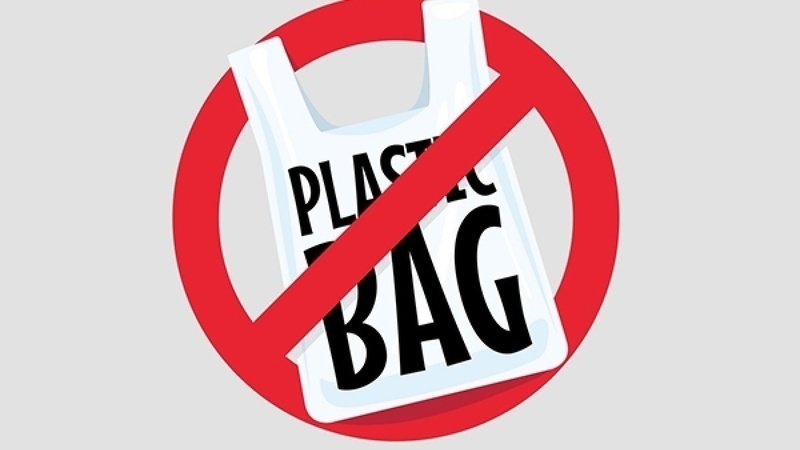Plastic bags below 40 microns thickness to be banned, producers seek Govt support to replace machines

By Kshitiz Siwakoti, Kathmandu, June 10: Presenting annual budget for the upcoming fiscal year, Finance Minister Bishnu Poudel recently announced that plastic bags below the thickness of 40 microns would be banned from the upcoming fiscal year 2021-2022.
In response to the need for banning the plastic bags, Director-General of the Department of Environment, Mukunda Prasad Niraula, said that plastic bags below the limit of 40 microns cannot be recycled. “Since these plastic bags cannot be recycled, they end up in landfills and rivers. Animals may eat those plastic bags and plastic bags also degrade the fertility of the soil,” Niraula told the TRN Online.
“In order to incentivise plastic manufacturers to produce plastic bags above 40 microns the government has decided to compensate for all the necessary changes needed to be made in the machinery to produce plastic bags above the thickness of 40 microns,” Niraula said.
The director general also said that currently there are no recycling plants in Nepal. In order to provide an impetus to this industry, the government has decided to remove income and import taxes for a period of three years for anyone wishing to start a recycling plant.
“Every year the illegal export of disposed of tyres and used batteries to recycling plants in India costs the economy approximately 16 Billion rupees,” Niraula added.
He further mentioned that the government has also been planning to open a recycling plant near Manmohan technical university in Hathimudha of Budhiganga Rural Municipality in Province 1.
Sharad Sharma, President of the Nepal Plastic Manufacturers Association, however, expressed disapproval of the way the ban was introduced without any research or consultation. “How is this ban supposed to help Nepali plastic producers when the government has laid no plans to stop the import of much cheaper and thinner plastic bags of around 10-15 microns from India and China?” Sharma questioned.
“On June 5, 2018, the Department of Environment had unilaterally, without any consultation with stakeholders, banned the use of plastic bags below 30 microns. As a result of this policy, many small scale plastic manufacturers had to be shut down resulting in job losses for many. The government failed to implement this law as well because plastic bags from 10-15 microns were still being imported from India and China” he added.
Despite all this, Sharma made it clear that the association and plastic manufacturers are ready to cooperate with the government provided that the government too is willing to consult with them. He also said that legally registered plastic manufacturers are producing plastic bags above 30 microns thickness.
“Providing mere compensation for replacements is simply not enough for us. Either the government needs to provide newer machines to abide by this policy or needs to make it easier for us to import such machines by providing loans, cancelling import tariffs and by providing us with income tax waivers until we can recover the cost of purchasing such machines,” Sharma added.
President Sharma further added that recycling plastic bags below 40 microns is possible. “Singapore allows usage of plastic even up to 15 microns thickness and yet they are able to recycle them readily,” Sharma mentioned.
The government had tried to ban plastic bags within the Kathmandu Valley before but had been unsuccessful in its implementation. On April 1, 2015 the government had published the Nepal Gazette which stated that plastic bags up to the size of 20 x 35 inches and up to 40 microns thickness were to be banned within the Kathmandu Valley with the law to be implemented from April 14, 2015.
However, Director-General Niraula said that its implementation could not take place as the 2015 earthquake rattled the country and then implementing the ban was no longer a priority for the government.
The government has mentioned it aims to encourage alternatives like cotton, jute and paper bags in the budget to replace plastic ones but has not yet set out a clear framework on how it will encourage for the use and production of these alternatives.
Recent News

Do not make expressions casting dout on election: EC
14 Apr, 2022
CM Bhatta says may New Year 2079 BS inspire positive thinking
14 Apr, 2022
Three new cases, 44 recoveries in 24 hours
14 Apr, 2022
689 climbers of 84 teams so far acquire permits for climbing various peaks this spring season
14 Apr, 2022
How the rising cost of living crisis is impacting Nepal
14 Apr, 2022
US military confirms an interstellar meteor collided with Earth
14 Apr, 2022
Valneva Covid vaccine approved for use in UK
14 Apr, 2022
Chair Prachanda highlights need of unity among Maoist, Communist forces
14 Apr, 2022
Ranbir Kapoor and Alia Bhatt: Bollywood toasts star couple on wedding
14 Apr, 2022
President Bhandari confers decorations (Photo Feature)
14 Apr, 2022










